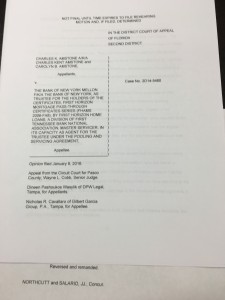Plaintiffs Must Overcome Defenses to Win Summary Judgment

Another appellate victory for
Dineen Wasylik and DPW Legal,
overturning an improper
grant of summary judgement
in a foreclosure appeal.
On appeal, we correctly pointed out that Rule 1.510 Requires that a motion for summary judgment “shall state with particularity the grounds upon which it is based and substantial matters of law to be argued,” as well as the myriad of cases that require plaintiffs to affirmatively overcome each and every defense before they can earn summary judgment. The appellate court ultimately agreed, and reversed the summary judgment, explaining:
It is true that the Bank did submit a response to an affidavit regarding the Paragraph 22 notice, disputing the Amstones’ affidavits that the notice had not been received or was deficient. But the Bank did not address the affirmative defenses in its motion for summary judgment. And at the hearing, the Bank’s counsel simply asserted that “the Affirmative Defenses were dealt with.” The Amstones’ counsel responded that the Bank had failed to refute all of the affirmative defenses…The Amstones’ counsel also emphasized that the affidavits regarding the Paragraph 22 notice crated a factual dispute that needed to be resolved. The court made no findings regarding any of these defenses. Accordingly, genuine issues of material fact remained, and summary judgment should not have been granted.
In our view, this was a case where strong advocacy at oral argument made a huge difference. What is not clear from the opinion is that the Bank argued that the defendants had waived this issue by failing to argue it on the record below, and the court seemed to want to buy that waiver argument. At oral argument, we were able to refute the waiver argument with citation directly to the proper part of the record showing why it was not waived. We’ve ordered the oral argument video, and will further expound on the important preservation issues in a later post, when we can share the video. But in the meantime, the lesson to be learned is that at the trial level, preservation is key, and at the appellate level, knowing your record cold is key (see my prior post on preparing for oral argument).
Attorney Ralph Fisher acted as able trial counsel, and ensured the issues were preserved on appeal.
The case is Amstone v. The Bank of New York Melon, No. 2D14-5480 (Jan. 6, 2016) [.pdf].

Leave a Reply
Want to join the discussion?Feel free to contribute!